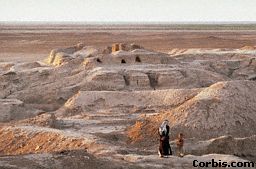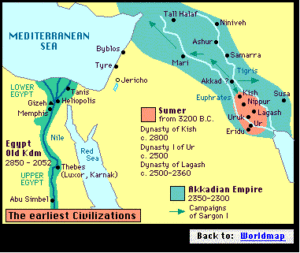(Texts: All Artifacts, Color Coding, & Writings in Bold Type With Italics Inside Parenthesis, are Added by Editor R. Brown, not the Authors, Translators, or Publishers!)
(gods in blue … mixed-breed demigods in teal)
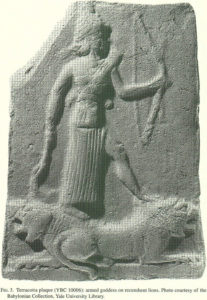 (Inanna & her house above Uruk)
(Inanna & her house above Uruk) 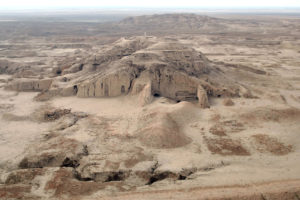
For the goddess Ištar-of-Uruk, sovereign of heaven and netherworld,
most powerful of the gods, august one, who executes the command she gives in the east and in the west,
the fierce goddess of battle who whirls around in the melee like a dust storm,
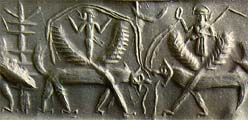
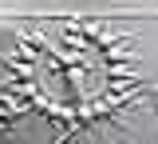
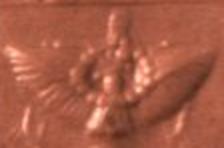 (Inanna & Ninurta riding their winged, fire-spitting flying storm beasts; Inanna high above in her storm beast / well armed sky-disc)
(Inanna & Ninurta riding their winged, fire-spitting flying storm beasts; Inanna high above in her storm beast / well armed sky-disc)
who goes at the side of the king, her favorite, (and) slays his foes, mistress of the lands,
who has gathered to herself (all) divine offices (and) administers correctly all purification rites,
(Inanna’s E-anna complex, her ziggurat temple residence in Uruk)
who dwells in Enirgalanim — which is inside Eanna — great lady, his lady:
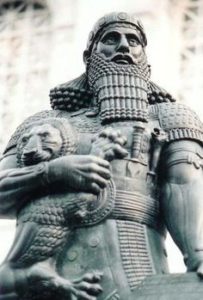
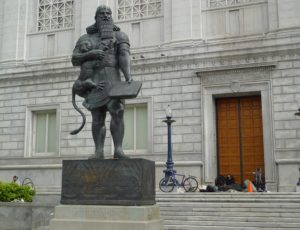 (giant semi-divine Assyrian King Ashurbanipal)
(giant semi-divine Assyrian King Ashurbanipal)
Ashurbanipal, great king, mighty king, king of the world, king of Assyria,
king of the four quarters (of the world), king of kings, prince who has no rival,
who rules from the Upper Sea to the Lower Sea and has subjugated all rulers;
who imposed the yoke of his rulership upon the city Tyre — which is in the midst of the Upper Sea —
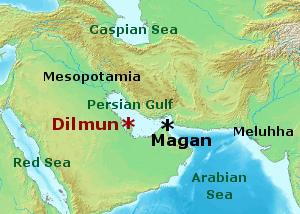
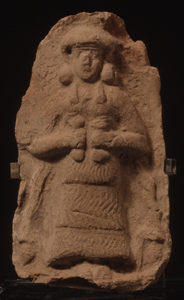 (pristine Dilmun, lands & sweet waters given by father Enki to Ninsikila)
(pristine Dilmun, lands & sweet waters given by father Enki to Ninsikila)
and Dilmun — which is in the midst of the Lower Sea — so that they bore his yoke (lit. “pulled his yoke-rope”);
whose deeds are pleasing to all the gods (and) whose shepherdship is sweet to the black-headed people;
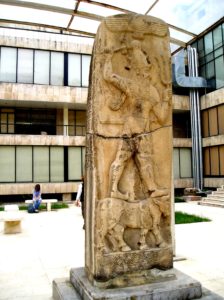
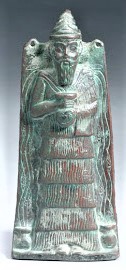 (Adad; Enki brings sweet water to the lands)
(Adad; Enki brings sweet water to the lands)
during whose reign the god Adad made his rain (and) the god Ea (Enki) his springs last a long time for his land,
(who) continually seeks after his people with prosperity and wealth,
whose people are all in a state of prosperity, and whose settlements rejoice;
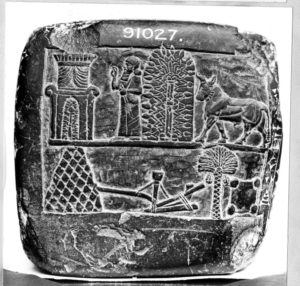 (giant Esarhaddon)
(giant Esarhaddon) 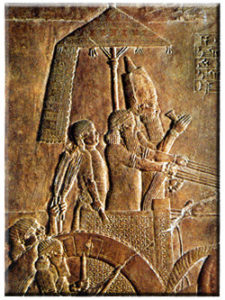 (giant Ashurbanipal)
(giant Ashurbanipal)
son of Esarhaddon, great king, mighty king, king of the world, king of Assyria,
viceroy of Babylon, king of the land of Sumer and Akkad,
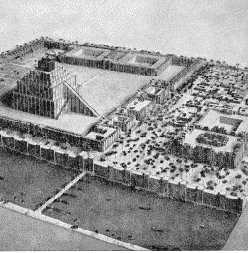
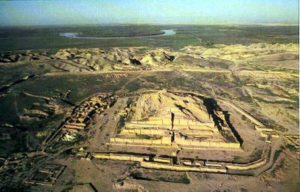 (Marduk’s Babylon; Marduk’s ziggurat residence in Babylon)
(Marduk’s Babylon; Marduk’s ziggurat residence in Babylon)
who (re)settled Babylon, (re)built Esagil, renovated the sanctuaries of all the cult centers,
and constantly established appropriate procedures in them;
grandson of Sennacherib, (who was) also great king, mighty king, king of the world, (and) king of Assyria —
During my reign, the great lord, the god Marduk, [entered] Babylon amidst rejoicing.
I (re)confirmed the regular offerings for Esagil and the gods of Babylon.
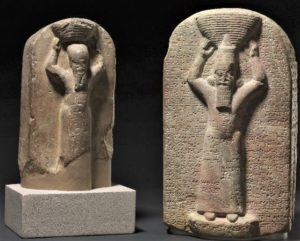 (giant brothers, mixed-breed semi-divine kings Ashurbanipal & Samas-suma-ukin)
(giant brothers, mixed-breed semi-divine kings Ashurbanipal & Samas-suma-ukin)
I (re-)established the privileged status of Babylon (and) appointed Šamaš-šuma-ukīn, my favorite brother,
to the kingship of Babylon in order that the strong might not harm the weak.
I completed the work on Esagil which had not been finished.
I decorated Esagil with silver, gold, and precious stones
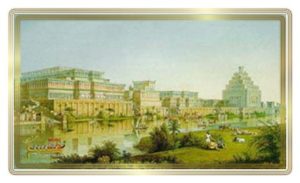 (Babylon, re-creation image)
(Babylon, re-creation image)
and made Eumuša glisten like the [stars (lit. “writing”) of the firmament].
I repaired the damaged parts of all their sanctuaries (and) extended (my) protection over all cult centers.
At that time, (with regard to) the enclosure wall of Ea[nn]a, the perimeter […]
which had become old, buckled, (and) a heap of ruin,
I sought their (original) emplacement [and had (them) (re)built anew.
I] completed (them), raising their tops (as high) as a mountain.
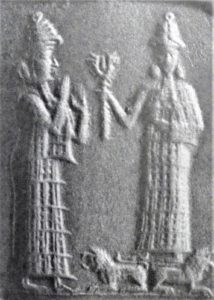 (Ninsun & Inanna,, goddesses residing in Uruk)
(Ninsun & Inanna,, goddesses residing in Uruk)
On account of this, may the goddess Ištar-of-Uruk, the great lady,
look upon this work with pleasure and may a go[od] word for me —
Ashurbanipal, king of Assyria (and) prince who reveres her— be set upon her lips!
[May she determine as my fate] a long life, fullness of old age, good health, (and) happ[iness]!
Moreover, with regard to Šamaš-šuma-ukīn, king of Babylon, my favorite brother,
may his days be long (and) may he be fully [satisfied with (his) good fortune]!
May any future prince, during the days of whose reign this work falls into disrepair, [renovate its] dilapidated sections!
May he write my name with his (own) name, look at my royal inscription,
anoint (it) with oil, offer a sacrifice, (and) place (my royal inscription) with his (own) royal inscription!
The goddess Ištar-of-Uruk will (then) listen to his prayers.
(But) as for the one who does not write my name with his name, (or) destroys my royal inscription,
or changes its position and does not place (it) with his (own) royal inscription,
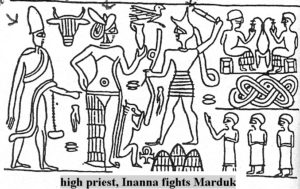 (Inanna as both Goddess of Love, & Goddess of War on the front lines)
(Inanna as both Goddess of Love, & Goddess of War on the front lines)
may the goddess Ištar-of-Uruk, great lady, glare at him angrily,
make his name (and) his descendant(s) disappear from the lands, and have no pity on him!
